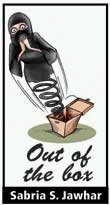
Monday, 25 December 2006
By Sabria S Jawahar
The Saudi Gazette
Last Monday Saudi Arabia released its national budget for 2007. It’s the largest in the Kingdom’s history, with projected revenues at SR400 billion ($106 billion) and expenditures at SR380 billion ($101 billion). A closer look, though, at the budget reveals that it was focused on the following areas; reducing the public debt, development and improvement of the citizens standard of living. It also emphasized the importance of building and developing the country’s infrastructure. In general, the budget can be rightly characterized as the second economic boom in the Saudi history.
Education, vocational training and human resources received the biggest portion of this year’s budget, which highlights the leadership’s desire for building capacities and securing a better future for the new generation.
“We are keen on meeting the requirements needed for raising the educational capabilities of teachers and improving their performance by introducing modern educational methods,” said King Abdullah Bin Abdul Aziz when he unveiled the budget during his weekly Cabinet meeting.
The King also issued directives to increase the capacity of educational institutions adding that these institutions would focus on specializations required by the labor market and here is where the great role of implementation comes.
The labor market, as the King stated, is the key word towards a successful education system and a good output. It should be tackled in context and factors other than those temporarily needed should also be taken into consideration. The labor market should not also be studied in isolation from the world’s trends simply because supply and demand are not a unilateral factor. The spending on education should not be limited to schools and opening of new facilities according to today’s or even tomorrow’s needs. Studying and analyzing the international market should be continuous and parallel to the educational development.
More graduates should be sent abroad not only to come back with new fields of knowledge but also to break the traditional cycle of education that has been producing poor-quality students since the 1970s. The Kingdom vitally needs new blood pumped into its education system.
Students have the right to be exposed to different cultures and educational backgrounds within the borders of their country. Employing qualified teachers and attracting scientists from all over the world is the fastest and best solution for any devastated education system. When it comes to education, quality should be our first concern and Saudization should come second. A huge budget such as that of Saudi Arabia should be closely watched, especially as it is directed towards building capacities and infrastructure. But building projects are subject to corruption if an oversight committee is not formed or activated if it does exist.
The committee should be responsible for following up the way the budget is spent and should be given access to all records and financial files of all ministries. It should be given the power to question and investigate officials at all levels. The same committee should determine and estimate both the time frame and budget required for each project included in the national budget. Some readers might think that the role of such a committee will overlap that of the Shoura Council committees, especially since they are entitled to discuss the performance of all ministries at the end of each year. This is not true. The Shoura committees depend on the reports submitted to them by the ministries themselves and have no right to investigate or penalize.
Those committees are also too weak even to solve problems. For example, what have those committees done concerning the unprecedented numbers of medical errors that took place in our hospitals? Are they happy with the level of health services that the Ministry of Health is offering? If yes, then a big question should be posed about the quality and competence of those committees.
What about education? Are the Shoura Council’s committees satisfied with its output? Do they believe that it is compatible with the international standards? Can our graduates work and survive outside our borders?
If such an accountability committee is not quickly established and its members carefully chosen, the impact of such a budget will not be seen on the citizens’ daily life or on the country’s development. Instead, we will also continue to see officials who are keen to save as much money as possible in their ministries’ savings not because of the lack of need but in order to pass it on to the following year’s budget as a surplus. This is not done, as one might think, to serve or save the national treasury. On the contrary, it is done to guarantee them longer office-terms. Others will spend as much as possible, not on the development of the country’s infrastructure, but on fake projects that don’t go beyond attractive archives files for those dead-before-born projects. Finally, hopes and lives are attached to this coming budget following the great depression that struck the market. People look at the budget as a way of salvation, so let’s not let them down.







